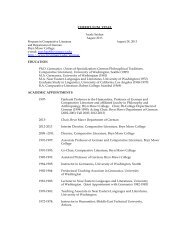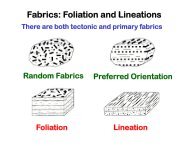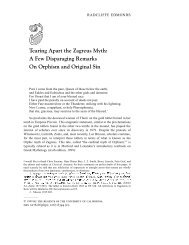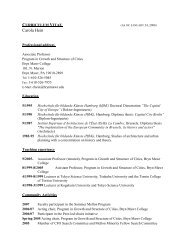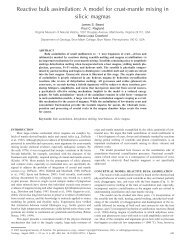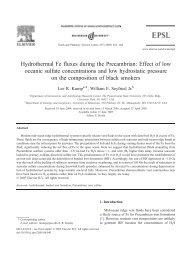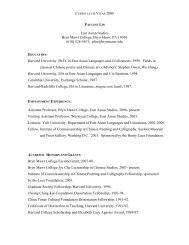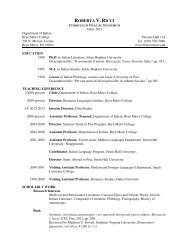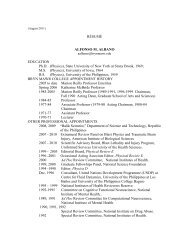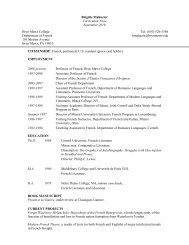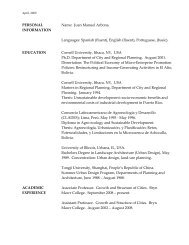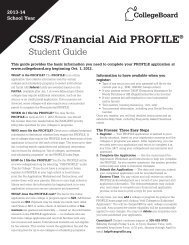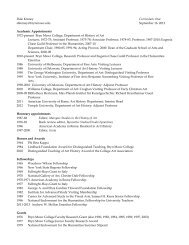Rediscovering Ying Qu and His Poetic Relationship to Tao Qian (clik ...
Rediscovering Ying Qu and His Poetic Relationship to Tao Qian (clik ...
Rediscovering Ying Qu and His Poetic Relationship to Tao Qian (clik ...
Create successful ePaper yourself
Turn your PDF publications into a flip-book with our unique Google optimized e-Paper software.
<strong>Ying</strong> <strong>Qu</strong> <strong>and</strong> <strong>His</strong> <strong>Poetic</strong> <strong>Relationship</strong> <strong>to</strong> <strong>Tao</strong> <strong>Qian</strong> 47<br />
is the corrupt gr<strong>and</strong> provisioner (taiguan 太 官 ), who puts everything<br />
from the imperial kitchen up for sale: “How would it be merely the<br />
salted meat <strong>and</strong> grain, / Even down <strong>to</strong> vinegar, meat sauce, salt <strong>and</strong> fermented<br />
bean paste he sells” 豈 徒 脯 與 糗 , 醯 醢 及 鹽 豉 .35 As <strong>Ying</strong> <strong>Qu</strong><br />
uncovers the inadequacy of those in power, he also comically portrays<br />
those who try <strong>to</strong> flatter their superiors in any way possible:<br />
漢 末 桓 帝 時<br />
郎 有 馬 子 侯<br />
自 謂 識 音 律<br />
請 客 鳴 笙 竽<br />
為 作 陌 上 桑<br />
乃 言 鳳 將 雛<br />
左 右 偽 稱 善<br />
亦 復 自 搖 頭<br />
In the reign of Emperor Huan, at the end of Han,<br />
There was a gentleman, a Duke Ma.36<br />
He considered himself well versed in music,<br />
And invited a retainer <strong>to</strong> play the pipes.<br />
[The guest] played “Mulberry by the Path,”<br />
But [the duke] claimed that it was “Phoenix <strong>and</strong><br />
her Chicks.”<br />
[Ma’s] attendants feigned their praises [of him],<br />
[The duke], for his part, also wagged his head.37<br />
The Honorable Ma’s pompous sense of self <strong>and</strong> his entire en<strong>to</strong>urage’s<br />
flattery culminate in a comic moment at the end of the poem when<br />
the duke nods his head in pride, on which the poet makes no further<br />
comment.<br />
The “Baiyi shi” also offers vignettes from the daily lives of the commoners,<br />
especially those from the countryside. One fragment of a<br />
poem depicts the routine of an impoverished rural resident, as well as<br />
his worries:<br />
平 生 居 □ 郭 All his life he dwelled in the outskirts of . . . .<br />
寧 丁 憂 貧 賤 The solitary man worries about his poverty <strong>and</strong><br />
humble position.<br />
35<br />
Lu Qinli, 1:471. On food <strong>and</strong> the terms used for food in early China, see David<br />
Knechtges, “A Literary Feast: Food in Early Chinese Literature,” JAOS 117.2 (1986), reprinted<br />
in his Court Culture <strong>and</strong> Literature in Early China (Aldershot: Ashgate Publishing<br />
Limited, 2002), pp. 49–63.<br />
36<br />
Zi <strong>and</strong> hou are two of the five ranks of nobility in the Han: gong 公 (duke), bo 伯<br />
(earl), hou (marquis), zi (count), nan 男 (baron). Wangzhi 王 制 , Liji zhushu 禮 記 注 疏 ,<br />
SKQS, 11.1a. Here <strong>Ying</strong> <strong>Qu</strong> is using zi <strong>and</strong> hou in the general sense of an aris<strong>to</strong>crat, “a duke<br />
or a baron Ma.” The character lang refers <strong>to</strong> a man, but it is also possible that here it is an<br />
abbreviated form of shilang 侍 郎 , an attendant gentleman, a post <strong>Ying</strong> <strong>Qu</strong> once held.<br />
37<br />
Taiping yulan, 490.14a; Lu Qinli, 1:471. My translation is based in part on the translation<br />
in Knechtges, “The Problem with Anthologies,” p. 11.




